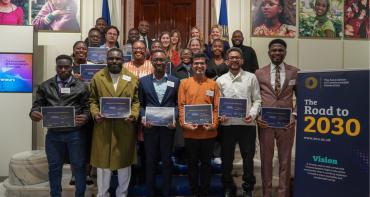Ela Beach, Port Moresby, Papua New Guinea 16-18 April, 2013
Youth: Our Common Wealth
Preamble
- Representatives of Commonwealth organisations, professional associations, civil society organisations and the private sector, herein referred to as the Stakeholders, convened at Ela Beach Hotel, Port Moresby, Papua New Guinea from 16-18 April 2013 at the Stakeholders Forum, to deliberate on the special theme: Young People at the Centre of Sustainable Development for the Eighth Commonwealth Youth Ministers Meeting (8CYMM).
- We appreciated the warm hospitality and support provided by the Government of Papua New Guinea in convening this Stakeholders Forum, recognising its importance and ensuring its successful completion.
- We recognised that the 8CYMM provided a high profile platform for Stakeholders to discuss and present our views on matters of common interest.
- We recognised that the challenge of youth development can only be addressed effectively through clearly expressed political will, coordinated action and committed partnerships with all Stakeholders: Youth development requires institutions that are fit for purpose.
- We noted that youth development is too important an issue to be left to line ministries alone. Alliances need to be made with other ministries, civil society organisations, the private sector and development partners to elevate the status accorded to youth development.
- We noted that although most Commonwealth member countries have prioritised youth development, the overall budgets and implementation of youth plans of action have not reflected this priority
Significance of the gathering
- This gathering takes place on the 40th anniversary of the Commonwealth Youth Programme. Furthermore the new Strategic Plans for both the Commonwealth Secretariat and the Commonwealth Foundation provide opportunities to focus on issues of youth development.
- Stakeholders are a valuable source of human, financial and technical capital as well as policy knowledge that could be mobilised by governments. It is important to recognise their role in supporting the development of young people and the significance of this to the sustainable economic and social development of our Commonwealth nations.
- We now call on the Youth Ministers Meeting to consider the following key issues and recommendations emerging from the Stakeholders Forum:
Opportunities for youth engagement and participation
- We note that the Commonwealth, as a development institution, has an obligation to increase the ability of young people to participate in its planning and policy making processes. Providing opportunities for more meaningful and empowering forms of youth participation in Commonwealth deliberative processes can only improve development outcomes.
- Recommendation: Stakeholders welcome the Commonwealth Youth Development Index as a tool to help focus policies and programmes. We call on the Ministers to embrace the Youth Development Index as an innovative policy development and advocacy tool, geared towards placing young people at the centre of collaboration.
Partnerships and Collaboration
- Stakeholders noted the importance of effective collaboration and partnership, with young people at the heart of it, for collective impact. We noted the development of the Pacific Youth Development Framework (PYDF) as an example where collaboration amongst development agencies has resulted in a comprehensive structure that aims to coordinate development assistance across the region, in the area of youth development. Scarcity of resources means that collaboration is essential to achieve impact. Partnerships need to be built at both national and regional levels and with all stakeholders including youth networks (particularly those that represent marginalised groups) and across the public and private sectors.
- Recommendation: Stakeholders therefore call for targeted resourcing of efforts that enable collaboration and focuses support at the country level to impact on critical youth issues. This includes an intellectual focus that improves the understanding and effectiveness of collaborative approaches to enhance outcomes.
- We also noted the need for improved accountability for the resources for youth empowerment programmes. Furthermore, accountability mechanisms need to be participatory and inclusive, providing opportunities for youth input.
Innovation for Youth Engagement
- New approaches for youth engagement and empowerment are emerging, such as Sport for Development and Peace. These approaches are gaining ground and need to be integrated and promoted in youth policy and programming, using a rights based approach.
- Recommendation: Integrating innovation in youth development requires deliberate planning, on-going management, robust monitoring and evaluation. More importantly policies and programmes promoting the use alternative approaches to youth engagement and empowerment are most effectively delivered through and with young people themselves and other stakeholders.
- We also urge greater recognition and use of youth networks, which provide platforms for young people to contribute their views on issues that directly impact their lives. These networks give young people a voice and help them to claim their space.
- We call for the support of National Youth Councils and for a legislative framework that guarantees their existence. Youth councils can act as catalysts for the development of youth exchange mechanisms within the Commonwealth
Youth employment and economic empowerment
- Youth employment is a direct recognition of the value and worth of young people in any society. However, youth unemployment is a growing concern in the majority of Commonwealth countries and impedes socio-economic development. Employment strategies continue to marginalise youth groups.
- Fortunately, there are already a number of good practice examples related to the improvement of young people’s employability in the Commonwealth. The Commonwealth Regional Youth Centres should act as a resource bank for such examples. National Youth Councils should compile and share these examples.
Recommendations
- We recommend that strategies for the employability of young people be based on customised education programmes, skills training and advocacy at the local and national level.
- We call for the strengthening of internship programmes and the expansion of other employable work experience opportunities.
- We also call for the deepening of initiatives geared to supporting youth economic empowerment such as the establishment of markets for young people, providing start-up funds and credit facilities for youth businesses. Collaboration with the private sector is crucial in this regard.
Young People as actors within the Human Rights Mechanisms
- Young people need to understand and know their rights so they are empowered to tackle prejudice and discrimination, improve relationships and make the most of their lives.
- Young people need to be engaged within Human Rights Mechanisms so they can claim their rights and fully participate at all levels both socially, economically and politically.
Recommendation:
- We call on governments to uphold, promote and protect the rights of all young people and make them central to the development so their voices are fully heard and are part of all processes. We believe that young people need to be educated about their rights so that they can fully engage and participate at all levels.
Young people in the post 2015 development agenda
- Stakeholders noted global processes aimed at shaping a post 2015 development agenda. We are concerned that young people’s voice from Commonwealth countries is missing from the post 2015 development discussions.
Recommendation
- We ask the Commonwealth to recommend to the UN High Level Panel on the Post 2015 development agenda and the Sustainable Development Goals Open Working Group that young people be placed at the centre of any new development framework through a goal focussed specifically on youth development and youth related indicators for all goals.
Conclusion
- We thank the Ministers for taking the time to consider our issues and recommendations. We would like to re-emphasise the need for deeper and broader participation of the youth and all Stakeholders in Commonwealth processes. Providing a genuinely open process of engaging different stakeholders and the youth themselves, in the design, implementation and monitoring of youth empowerment strategies is essential to developing accountable institutions, that will ensure progress in youth development.



